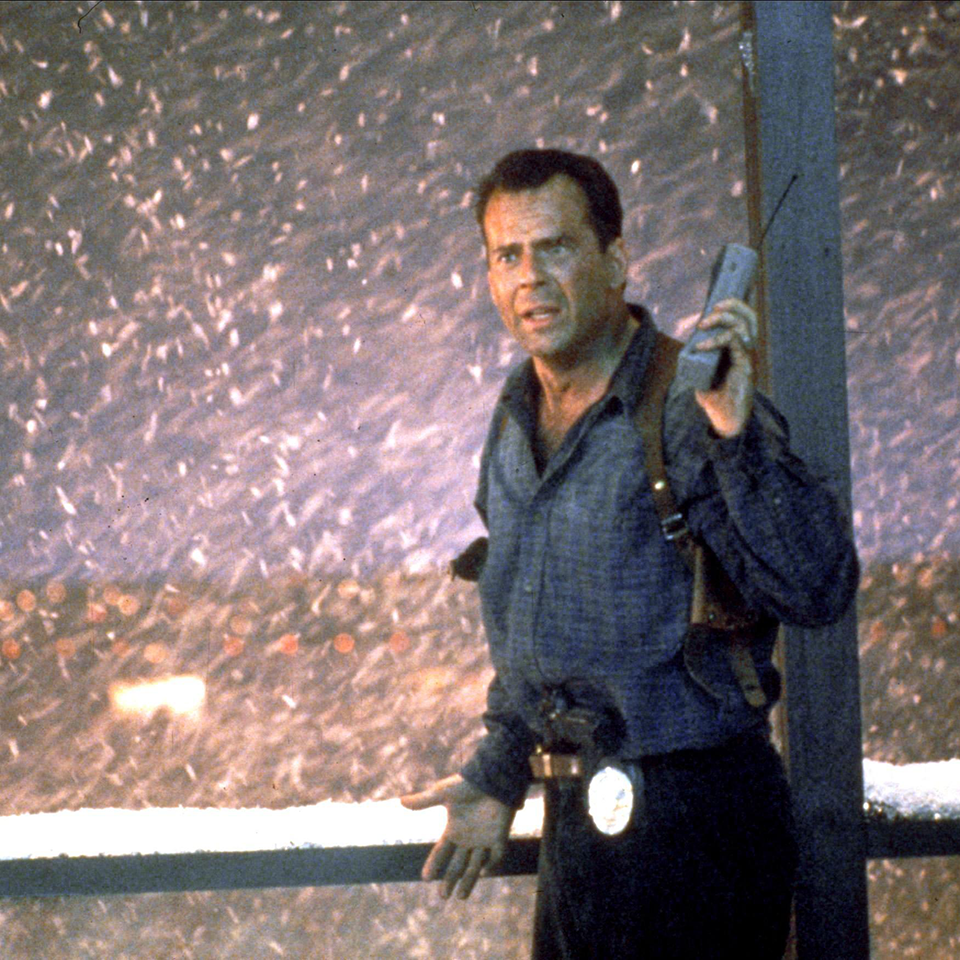Die Hard a Christmas movie? It might be downright scriptural!
It’s one of those questions in popular culture that we bat around every year with different commentators offering different criteria for what is required to fit the description. For my part, it’s enough that the film is set on Christmas Eve, at a Christmas party, and begins with the theme of reconciling an estranged family in time for holiday celebrations.
Yes, Die Hard is obviously a Christmas movie.
Moreover, many commentators have noted that the hero of Die Hard, John McClane, played by Bruce Willis, clearly embodies a version of a Christ figure. McClane descends from the sky bearing gifts for his own people, but he soon gets bruised and bloodied for the sake of strangers—even spending most of the movie utterly vulnerable in his bare feet—before casting down his enemy and setting the captives free. For these reasons, Die Hard is not only a Christmas movie, but also an Easter movie—a link we ought to see more often in our December viewing.
But there is a lot more to Die Hard that invites contemplation of the effect of the Incarnation of the Son of God than just the stock savior elements of the main character. One of the most important elements of Die Hard is the contrast between the stated ideals of the bad guys, led by Hans Gruber, and their actual, selfish intentions. Indeed, the real theological depth of Die Hard may be found in its depiction of sin, which Christians understand as an absurd aberration from the designs of God, restored in the coming of Christ. Sin often hides in a cloak of righteous language; and Gruber, played by Alan Rickman, storms into the Nakatomi Corporation’s Christmas party accusing the company of reckless capitalistic greed, then offering “a lesson in the real use of power,” perversely evoking Mary’s Magnificat. Then Gruber, with a demonic glow in his eyes, declares, “You will be witness,” appropriating the words of Jesus to the apostles just before his Ascension into heaven (Acts 1:8).
We soon discover that Gruber’s talk of casting down the mighty from their thrones is bogus. Gruber does not even attempt to hide his tracks very well, because he knows he can rely on prideful law enforcement officials—excited to show off their anti-terrorism skills—to treat him as much more than a petty thief. Gruber laughs to McClane, “Who said we were terrorists?!” He eventually rattles off a list of political prisoners around the world that he and his group supposedly want to set free, but their real goal is emptying the vaults, even if it means blowing up a skyscraper and killing a lot of innocent people. Here we remember that when humans erect the façade of taking extreme measures for a noble end, we need only look behind the curtain to find someone serving his basest desires instead.
Original sin is pesky; but the Incarnation demonstrates that it isn’t as complicated as we might think. It takes willpower, but with Christ’s help, we can dispense with the works of darkness in our midst. Die Hard presents John McClane picking off the bad guys one by one, eventually crawling through a ventilator shaft with a lighter—a tiny fire that will grow to consume almost everything.
Gruber mistakes McClane’s virtue for weakness, saying, “You won’t hurt me. You’re a policeman. There are rules for policemen.” When Gruber realizes McClane will not relent, he mocks him, again with a demonic resonance, asking, “Who are you? Just another orphan of a bankrupt culture who thinks he’s John Wayne, Rambo, Marshal Dillon?” But McClane, although far from sinless, resists his enemy’s wiles. He surprises Gruber, identifying not with any macho gunslinger, but Roy Rogers, the singing cowboy. McClane says he always admired Rogers’ campy sequin shirts, proving he imitates the saints in at least one regard—namely, he doesn’t take himself too seriously. On the other hand, Gruber, who touts his “classical education” and Saville Row suits, most certainly does esteem himself highly . . . and to his ultimate demise. The guy obviously has a lot of money and stuff already, but he wants more, just like Ebenezer Scrooge, Mr. Potter, the Grinch, or any other classic bad guy in Christmas stories.
On the other hand, McClane, for all of his profanities, is downright pastoral even as he drags his mangled flesh around trying to take on a small militia. He befriends Sgt. Al Powell, who helps McClane on the ground by communicating through the radio. Powell knows a brother cop when he hears one; and McClane is eventually able to speak to him from his own experience about the pain of making lethal mistakes while on the beat. Powell has accidentally killed a child, and he believes he is ruined for street duty forever. But with McClane’s confidence in him, he is able to step up in the end, get over his fears, and save lives. It’s a moment of discipleship and redemption. More Christmas stuff.
The end of Die Hard offers the most basic consolation of Christian theology: the hope of healing and restoration. The McClane family is reunited, and Los Angeles is safe again just in time for a visit from St. Nick.
When I watch Die Hard every December, I thank God for a startling account of sin and evil, and I hoot and holler a bit for the victory of John McClane, and more importantly for the victory of my Savior, Jesus Christ.
Yippee-ki-yay. And Merry Christmas.
